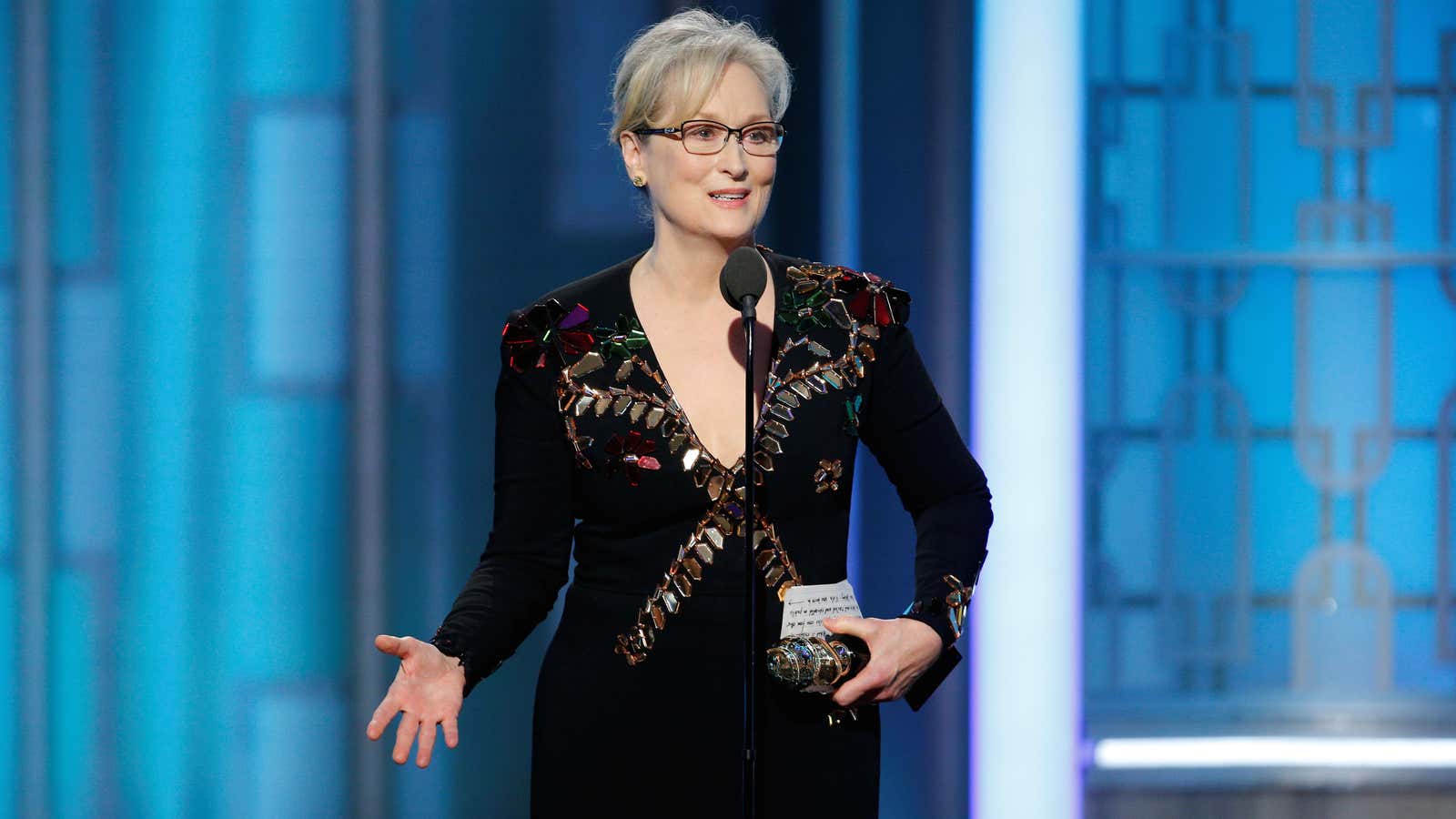Meryl Streep could have made her big moment at the 2016 Golden Globes all about her. As the recipient of the Cecil B. Demille Award lifetime achievement award, she had every right to revel in her rarefied status among the film industry’s all-time greats. The star’s decades-long career blazed a trail for women in Hollywood and positioned her as a gold standard for actors everywhere.
But rather than simply bask in glory, Streep chose to take the opportunity to deliver an important message to an international audience. With Donald Trump’s inauguration as US president mere days away, Streep had a message for the man who will soon become, for better or worse, the leader of the “free” world. And she had the undivided attention of millions of people watching at home.
Confessing that she had coincidentally lost her own voice earlier that weekend, Streep used her platform to speak up for those who have been rendered voiceless. Eminently aware of her own position as a wealthy white woman in a liberal field, Streep redirected the spotlight to the actors, filmmakers, and artists who make film and television such an important creative avenue of resistance and representation. Streep issued a call to action, demanding that those in positions of power, including Trump, recognize and work to fix America’s rampant inequality.
In an industry that relies heavily on our First Amendment freedoms, Streep used her own privilege and influence to forcefully and sincerely advocate for others. Her speech is a classic example of “allyship”—when people use their privilege and social standing to work alongside marginalized people and lift up their causes. In recent years, Hollywood has become a lynchpin for equality efforts, as demonstrated recently by April Reign’s decision to launch the hashtag #OscarsSoWhite. Streep’s speech may have helped prove Reign’s point, underscoring how Hollywood as an institution can help lead the way. That is, if the industry’s power brokers and others recognize that the arts, politics, and identity are interconnected.
“An actor’s only job is to enter the lives of people who are different from us and let you feel what that feels like,” Streep explained, recalling the infamous moment in which Trump appeared to mock reporter Serge F. Kovaleski—who has a physical disability—on the campaign trail. (Trump denied that he was mocking Kovaleski.)
Streep was struck by that moment in particular, she said, because of the way it revealed how easily people can choose to be cruel to others who have less power:
It kind of broke my heart when I saw it, and I still can’t get it out of my head because it wasn’t in a movie. It was real life. And this instinct to humiliate when it’s modeled by someone in the public platform by someone powerful, it filters down into everybody’s life ‘cause it kind of gives permission for other people to do the same thing. Disrespect invites disrespect. Violence incites violence. When the powerful use their position to bully others, we all lose.
Unsurprisingly, Donald Trump did not take kindly to the actor’s critique. In an interview with the New York Times, the president-elect derided Streep as a “Hillary lover.” He called her “underrated” on Twitter. He attacked Streep as part of the “Hollywood elite,” an out-of-touch group disconnected from the needs and concerns of “real Americans.”
But Streep is just as American as a coal miner from West Virginia. She’s certainly as real as Trump, the billionaire son of a New York City millionaire. Indeed, during her speech, Streep recalled her experiences growing up in New Jersey’s public school system. She also mentioned actress Sarah Paulson, a queer woman born in Florida and raised by a single mother in Brooklyn; Loving star Ruth Nega, born in Ethiopia and raised in Ireland; and Streep’s good friend Viola Davis, a black woman born in a sharecropper’s cabin in South Carolina, who was just awarded her own star on the Hollywood Walk of Fame.
It’s important to note that Streep did not attempt to monopolize the struggles of others or to make it seem as if America’s ongoing fight against injustice revolved around her. She noted that Hollywood is often at the vanguard of the fight for free creative expression, and implored her peers and the public to support groups like the Committee to Protect Journalists. She stressed the importance of First Amendment rights as a means of elevating marginalized communities, and said that it is vital to ensure that press freedoms are not curtailed by an executive who has made his hatred of the press well known.
Looking beyond Hollywood, Streep’s approach to allyship is a model that can be applied to many other professional and personal situations. A few lessons from her speech:
- If the issue itself is not about you, don’t make it about you.
- Shine the spotlight on the people who are most affected, and what they’re doing to lead the change. Follow that leadership.
- Make your position known forcefully but fairly.
- Facts are your friend, as is data.
To give a corporate example, if a company or industry’s demographic breakdown shows only 10% of the workforce comes from communities of color, point to that severe underrepresentation as an indicator of the problem and as a jumping off point to cultivate enhanced diversity.
Above all else, even when it’s hard or scary, learn to make good use of the platforms you are given. Make yourself vulnerable, and speak from the heart. You never know who might be listening.
